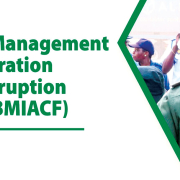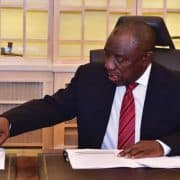|
Getting your Trinity Audio player ready...
|
The revitalisation of the National Prosecuting Authority (NPA) is under way. On Friday the recently appointed national director of public prosecutions (NDPP), Shamila Batohi, briefed the media on progress in this regard, and also made way for Advocate Hermione Cronje, the newly appointed head of the investigating directorate within the NPA, to shed light on the progress in establishing the unit.
Batohi would have held the latest briefing sooner but, she admitted, she underestimated the internal and external challenges in tackling the situation in the NPA at the moment.
“One of my top priorities is addressing the NPA leadership crisis, as this is critical to restoring the credibility of the institution,” she said. “It needs fresh new dynamic leadership and we have made some changes but more needs to be done.”
Important progress will be made shortly, Batohi added.
Another priority has been reviews of investigations of high-profile cases – the NPA has identified a number of cases, including some investigated by Ipid, which are currently under review.
High-profile cases under review
Also, a review of the structure of the NPA is in progress. “To improve effectiveness, I have decided on a decentralised model which is in line with the NPA Act, with a small specialised highly skilled core team at the national office to actively support prosecution in the regions. This will also boost capacity in the regions,” Batohi explained.
But to do all of this, it is vital to secure more budget for the NPA, as the underfunding has been a crippling problem for the NPA and for criminal justice. “There has been no recruitment in the NPA since 2016. The impact on the delivery of justice and the morale of prosecutors is huge. We cannot have the situation persisting or we will not be able to deliver the service people deserve and expect.”
With the heads of other law enforcement agencies, who were also present at Friday’s briefing, she acknowledges issues such as lack of skills, lack of discipline, and corruption – “these challenges in law enforcement as well as prosecution also have to be addressed” in order to restore the rule of law and build confidence in South Africa’s institutions.
Her vision, she said, was that of all NPA staff – to rebuild and lead a trusted and effective prosecution service that pursues justice for all South Africans through independent professional and victim-centred service delivery.
“This vision depends on four key pillars: credibility, independence, professionalism, and accountability.” Batohi stressed, several times, the need for the NPA to be independent, as this will help to ensure it will not favour some cases over others because of political pressure. “The country is crying out for effective prosecutions.”
“When you go after the king, you have to kill him”
And with corruption having become entrenched in South African society, there is tremendous hunger and impatience for justice, while the expectations for immediate arrests are high. Batohi said that that despite this pressure, the public can view the new investigations directorate as a move in the right direction.
“The proclamation of the investigations directorate is an important step in restoring the rule of law in South Africa,” said Batohi. “The police service and the NPA are working closely to ensure that we can address the scourge of corruption in our country and in our society at different levels.”
Respect for the rule of law will prevail, she stated, and those responsible will be held accountable.
Acutely aware that not everyone will support Batohi’s NPA and its vision, she said: “When you go after the king you have to make sure you kill him. That means we need to have a watertight case. Not just the evidence will be attacked, but we will be attacked, from various quarters.”
While the country has high expectations and hopes for the NPA in the future, Batohi added, the institution cannot rush to bring cases to court. This is the best way to ensure that all cases are solid.
‘New Scorpions’ to tackle high-level corruption
The creation of the investigating directorate, announced by President Cyril Ramaphosa during his State of the Nation address in February this year, is a key weapon in managing cases relating to state capture. “In broad terms, the Directorate will focus on the evidence that has emerged from the Zondo Commission of Inquiry into State Capture, other commissions and disciplinary inquiries. It will identify priority cases to investigate and prosecute and will recover assets identified to be the proceeds of corruption,” Ramaphosa said at the time.
“The Directorate will bring together a range of investigatory and prosecutorial capacity from within government and in the private sector under an investigating director reporting to the NDPP. In the longer term, we will work with the NPA and other agencies of law enforcement to develop a more enduring solution that will strengthen the capacity of the criminal justice system to deal with corruption,” the president added.
The new unit, thus far referred to simply as the investigating directorate (ID), is headed by Advocate Hermione Cronje. Introducing her to the attendees, Batohi described her as highly regarded and with a Masters in Public Administration from Harvard University and LLB degree from Cape Town University, is more than capable of handling the big task ahead of her.
“Institutions and state-owned enterprises (SOEs) are in a poor state, and there is a need to send a strong message that those who pocket funds earmarked for the development of the country and for meeting the needs of the people, will face the consequences of their actions,” Cronje said. “But I have no illusions that those who are responsible are sitting by idly waiting for us to get our act together.”
The mandate and scope of the directorate were set out in the gazetted proclamation. “We are required to focus on serious, complex and high-profile corruption, particularly those cases emanating from the commissions of inquiry into state capture, the revenue service, etc.”
From the outset the ID would focus on three broad themes or areas:
- Corruption in the security sector, specifically the criminal justice system. In order to succeed in this, the NPA must “get our own house in order first”.
- SOEs – Eskom, Transnet, Prasa, and a few others.
- High-level private and public sector corruption.
The focus will be on those who have systematically and actively sought to corrupt government procurement systems and services for private gain, Cronje warned.
“We will probably only take on a very small number of cases. Our case selection criteria will target those who planned, instigated and orchestrated the corruption of the system and those who ultimately derived benefit from the looting of state coffers – not just the foot soldiers.”
Although the pressure is already on the ID to produce results, Cronje said it is not a replacement for the existing structures – but rather, its role is to address high-level corruption. Perpetrators of this type of corruption have been getting away with it for years, but those days are over, if Cronje and Batohi’s assurances are anything to go by.








